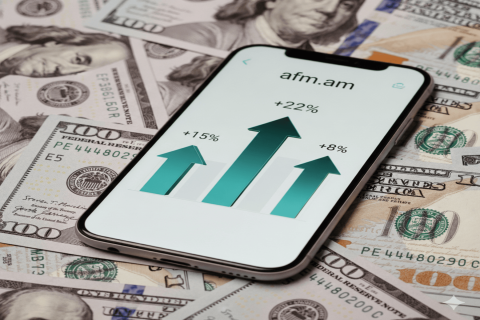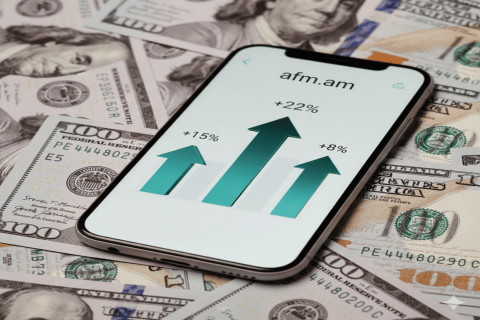Where to Get a Credit Card in Armenia with the Maximum Limit: Comparing Banks and Conditions

Latest news
The Best Euro Deposits in Armenia in Autumn 2025
Top Deposits in USD in Armenia in Autumn 2025
Top Deposits in AMD in Armenia in Autumn 2025
Profitable Promotions in Armenian Banks in October 2025
How Not to Fall Victim to Fraud in Armenia: Real Stories and New Tricks
Which investment opportunities are the best in Armenia?
Author
Source
AFMTopic
Credit Cards, Ameriabank
Do you want to know how to get up to 30 million drams, enjoy airport privileges, and avoid unnecessary interest? Use a credit card. But before using the card, to avoid overpaying, it is necessary to thoroughly study its functionality, understand the key differences from a debit card, and determine which banks offer the most attractive conditions.
What is a credit card and how does it work?
First of all, a credit card is not your money, but the bank's funds, which it temporarily lends you. Unlike a debit card, where you spend only your own money, a credit card allows you to pay for purchases at the bank's expense - with an obligation to repay the amount later, within a certain period of time. If you meet the grace period, no interest will be charged. Otherwise, the amount owed will be charged at a rate that can range from 13% to 24% per annum, depending on the card and the bank.
A credit card is convenient if:
- you want to have a financial cushion for unforeseen expenses;
- you travel frequently or make large purchases;
- you want to participate in bonus programs (cashback, points, discounts);
- you need to cover a temporary cash gap without taking out a traditional loan;
- you often shop online and need a reserve for large orders or promotions;
- you have your own business and need money to cover cash flow gaps or unforeseen expenses;
- you are relocating and your expenses are higher than planned, with income expected later.
How does a credit card differ from a debit card?
| Criterion | Credit Card | Debit Card |
| Whose money | Bank's money | Your own |
| Interest | Yes, if grace period is not met | No |
| Grace period | Yes | No |
| Purpose | Borrowing for purchases | Spending within balance |
| Limit | Depends on income and bank (up to 30 million drams) | Up to the account balance |
When using a credit card, you are essentially using the bank's money. This means that with each purchase or cash withdrawal, you borrow funds from the financial institution and then commit to repaying them within a set period, often with interest if you do not meet the grace period.
In contrast, a debit card is your personal "wallet" in digital format. With it, you spend your own funds that are in your bank account. You can only use the amount that is on the balance, and no debts or interest arise from this.
Where to Get a Credit Card with the Highest Limit?
We have analyzed offers from Armenian banks and highlighted cards with the maximum limit and reasonable conditions. The table below shows the leaders.
| Bank | Card | Limit | Grace Period | Effective Rate | Maintenance |
| Acba Bank | ArCa Credit | up to ֏30,000,000 | None | 18.58% – 23.93% | ֏3,600 / year |
| Acba Bank | Visa Gold / Mastercard Gold | up to ֏18,000,000 | 45 days | 14.58% – 17.69% | ֏18,000 / year |
| Ameriabank | Visa Signature | up to ֏18,000,000 | 30 days | 13.7% – 18% | ֏6,000 / month |
Table Summary:
- Acba Bank offers the maximum credit limit of 30 million drams with its ArCa Credit line. However, ArCa cards do not have a grace period and have a higher interest rate.
- Ameriabank offers a balance of high limit, grace period and favorable rate, making it the most suitable choice.
Checklist: How to Use Your Credit Card Wisely
- Adhere to the grace period to avoid paying interest.
- Set up autopay, especially if the bank has a mobile app.
- Choose a card with loyalty programs – points, miles, lounge access.
- Check rates and fees, especially for cash withdrawals, as these often "hide" costs.
- Avoid cash withdrawals – this immediately nullifies the grace period and increases the interest rate.
- Monitor your credit history – even a 1-day overdue payment can damage your credit score.
What is the difference between a credit line and a credit card?
A credit line and a credit card are not quite the same, although they are closely related and both are tools for accessing borrowed funds.
A credit line is a broader concept. It is an agreement between a borrower and a bank that allows the borrower to draw funds up to a certain limit at any time and repeatedly, provided that previously borrowed amounts are repaid. A credit line can be opened for both individuals and legal entities and can take various forms. For example, an overdraft on a current account, or a separate revolving credit line.
A credit card is one form of implementing a credit line. Essentially, a credit card is a tool for accessing the credit line provided to you by the bank. It allows you to conveniently use the funds from this line: pay for purchases in stores, online, and withdraw cash, although this is usually disadvantageous.
In other words:
- A credit line is the money limit available to you from the bank.
- A credit card is a plastic or virtual card that serves as the key to this limit.
Thus, every credit card provides access to a specific credit line, but not every credit line is necessarily associated with a credit card (for example, there are non-card credit lines for businesses).
How to Apply for and Use a Credit Card?
Application Process:
- Online Application: Many Armenian banks allow you to submit a preliminary credit card application online. This typically involves filling out a form on the bank's website, providing personal details (full name, passport information), contact information, and details about your income and employment.
- Bank Visit: In most cases, even if the application is submitted online, the final contract signing and card collection will require a personal visit to a bank branch. This is necessary for identity verification and providing original documents.
- Through AFM: On our platform, you can compare offers from different banks and apply directly through the website, simplifying the selection process.
Required Documents:
- Identification: This usually includes a passport and a social card or ID.
- Income Verification Documents:
- Income Certificate: This is the most common and preferred document for banks to confirm your solvency.
- Bank Account Statement: Some banks may consider issuing a card based on an analysis of your account transactions if you don't have an official income certificate. This demonstrates regular incoming funds.
- Employment Details: In some cases, information about your workplace, position, and work experience may be required.
- Other Documents: Depending on the bank and the requested limit, additional documents may be needed, such as a marriage certificate (if you are married), or property ownership documents (if it affects the credit scoring).
Processing Times:
Application processing times can vary from a few minutes (for preliminary online approval) to several business days. This depends on the bank's internal policy, the completeness of the documents provided, and the complexity of checking your credit history and solvency.
After card approval, its issuance and delivery (if applicable) may also take some time.
Credit Card Usage Process:
How the Grace Period Works:
- Definition: The grace period is a timeframe during which you can use the bank's money without incurring interest charges. The document specifies different grace periods: 45 days for Visa Gold/Mastercard Gold from Acba Bank, 30 days for Visa Signature from Ameriabank, and a complete absence of a grace period for ArCa Credit from Acba Bank.
- Start of Calculation: The grace period usually begins from the date of the first purchase (or the start of the billing cycle, which the bank sets).
- Condition for Retention: To avoid interest charges, you must fully repay the entire outstanding amount (or at least the minimum payment) before the end of the grace period. If you do not meet this deadline, interest will be charged on the entire outstanding amount, starting from the moment it arose.
- Attention: As stated in the life hacks, cash withdrawals from a credit card (or fund transfers) often immediately nullify the grace period and lead to interest and fee charges.
Interest Accrual:
- Accrual Principle: If you do not repay the debt within the grace period, the bank begins to charge interest on the amount used. The rate can vary (the document indicates from 13% to 24% annually).
- Types of Rates: It is important to distinguish between the nominal and effective rates. The effective rate (listed in the table as "Effective Rate") includes all additional fees and payments, providing a more complete picture of the cost of the loan.
- Calculation: Interest is calculated daily on the outstanding balance. The longer you do not repay the debt and the higher the amount, the more interest will be accrued.
Debt Repayment:
- Minimum Payment: The bank issues a monthly statement showing the full outstanding amount and the minimum payment due. The minimum payment is just a small portion of the debt that you are obligated to pay to avoid late fees and penalties. However, making only the minimum payment does not exempt you from interest charges on the remaining debt.
- Full Repayment: To avoid interest and effectively use the grace period, it is recommended to repay the full outstanding amount before the end of the grace period.
- Repayment Methods:
- Through Mobile App/Online Banking: Many banks offer convenient auto-payment features or manual card account top-ups.
- Bank Transfer: You can transfer money to your credit card account from another one of your accounts.
- Cash Deposit: Through a bank teller or ATMs with cash deposit functionality.
- Control: It is important to regularly check your card statements and monitor payment due dates to avoid late payments. Setting up autopay, as advised in the life hacks, can significantly simplify this process.
FAQ: Frequently Asked Questions about Credit Cards
Question: Can I get a credit card without official income?
Answer: Most banks require an income certificate, but in some cases, it may be possible to get one based on transaction analysis (e.g., based on the movement of funds in your account).
Question: Can I apply for a credit card online?
Answer: Online application is possible, but the final signing of the agreement often requires a visit to the bank.
Question: How can I find out if a card has a grace period?
Answer: This information is specified in the tariffs. If it's not listed, it's likely there isn't one.
Question: Can I withdraw cash from a credit card?
Answer: Yes, but it's unfavorable — interest is immediately charged, and there may be a fee. It's better to pay directly with the card.
Question: Does using a credit card affect my credit rating?
Answer: Yes, regular use and timely repayment improve your credit history. Conversely, late payments, even by one day, or failure to meet obligations can significantly damage it.
Does only the income received on this particular card influence the approval of the maximum credit, or can income from other cards also be considered?
When approving the maximum credit, banks typically consider your overall income, not just deposits to one specific card. You can provide information about income from other cards or accounts so that the bank can more fully assess your solvency. Most banks require an income certificate, but in some cases, credit approval may be possible based on transaction analysis, for example, by analyzing the movement of funds in your account.
Conclusion: Which Card to Choose?
A credit card can be a powerful financial tool if used wisely. In Armenia, offers are available with limits up to ֏30 million, but the maximum amount isn't always the best choice. It's important to consider:
- the presence of a grace period
- interest rates
- maintenance costs
- your goals for using the card
Ameriabank offers a balanced option: a high limit amount, moderate rates, and a convenient grace period. This is especially beneficial for those who value flexibility, security, and bonus options.
To save time on manually analyzing terms, use the AFM platform — the first financial marketplace in Armenia. Here you can:
- compare all credit cards by limits, rates, and fees
- choose the best one based on your goals
- apply directly from the page
- receive current offers without calling the bank
Don't overpay — find a beneficial credit card with AFM and stay one step ahead.

The Best Euro Deposits in Armenia in Autumn 2025

Top Deposits in USD in Armenia in Autumn 2025

Top Deposits in AMD in Armenia in Autumn 2025

Profitable Promotions in Armenian Banks in October 2025






